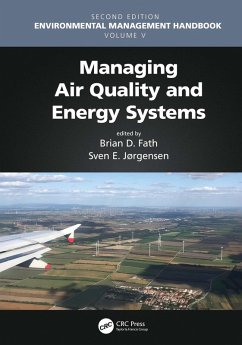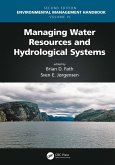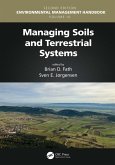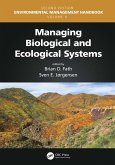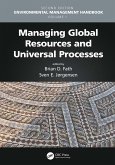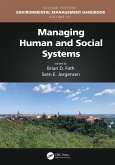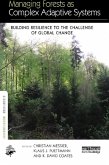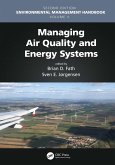Managing Air Quality and Energy Systems (eBook, ePUB)
Redaktion: Fath, Brian D.
64,95 €
64,95 €
inkl. MwSt.
Sofort per Download lieferbar

32 °P sammeln
64,95 €
Als Download kaufen

64,95 €
inkl. MwSt.
Sofort per Download lieferbar

32 °P sammeln
Jetzt verschenken
Alle Infos zum eBook verschenken
64,95 €
inkl. MwSt.
Sofort per Download lieferbar
Alle Infos zum eBook verschenken

32 °P sammeln
Managing Air Quality and Energy Systems (eBook, ePUB)
Redaktion: Fath, Brian D.
- Format: ePub
- Merkliste
- Auf die Merkliste
- Bewerten Bewerten
- Teilen
- Produkt teilen
- Produkterinnerung
- Produkterinnerung

Bitte loggen Sie sich zunächst in Ihr Kundenkonto ein oder registrieren Sie sich bei
bücher.de, um das eBook-Abo tolino select nutzen zu können.
Hier können Sie sich einloggen
Hier können Sie sich einloggen
Sie sind bereits eingeloggt. Klicken Sie auf 2. tolino select Abo, um fortzufahren.

Bitte loggen Sie sich zunächst in Ihr Kundenkonto ein oder registrieren Sie sich bei bücher.de, um das eBook-Abo tolino select nutzen zu können.
This volume introduces the concepts and processes of atmosphere with its related systems. It explains how these systems function and provides strategies on how to best manage them. It serves as an excellent resource for finding basic knowledge on the atmosphere and includes important problems and solutions that environmental managers face today.
- Geräte: eReader
- ohne Kopierschutz
- eBook Hilfe
- Größe: 34.79MB
Andere Kunden interessierten sich auch für
![Managing Water Resources and Hydrological Systems (eBook, ePUB) Managing Water Resources and Hydrological Systems (eBook, ePUB)]() Managing Water Resources and Hydrological Systems (eBook, ePUB)51,95 €
Managing Water Resources and Hydrological Systems (eBook, ePUB)51,95 €![Managing Soils and Terrestrial Systems (eBook, ePUB) Managing Soils and Terrestrial Systems (eBook, ePUB)]() Managing Soils and Terrestrial Systems (eBook, ePUB)57,95 €
Managing Soils and Terrestrial Systems (eBook, ePUB)57,95 €![Managing Biological and Ecological Systems (eBook, ePUB) Managing Biological and Ecological Systems (eBook, ePUB)]() Managing Biological and Ecological Systems (eBook, ePUB)46,95 €
Managing Biological and Ecological Systems (eBook, ePUB)46,95 €![Managing Global Resources and Universal Processes (eBook, ePUB) Managing Global Resources and Universal Processes (eBook, ePUB)]() Managing Global Resources and Universal Processes (eBook, ePUB)47,95 €
Managing Global Resources and Universal Processes (eBook, ePUB)47,95 €![Managing Human and Social Systems (eBook, ePUB) Managing Human and Social Systems (eBook, ePUB)]() Managing Human and Social Systems (eBook, ePUB)48,95 €
Managing Human and Social Systems (eBook, ePUB)48,95 €![Managing Forests as Complex Adaptive Systems (eBook, ePUB) Managing Forests as Complex Adaptive Systems (eBook, ePUB)]() Managing Forests as Complex Adaptive Systems (eBook, ePUB)52,95 €
Managing Forests as Complex Adaptive Systems (eBook, ePUB)52,95 €![Managing Air Quality and Energy Systems (eBook, PDF) Managing Air Quality and Energy Systems (eBook, PDF)]() Managing Air Quality and Energy Systems (eBook, PDF)64,95 €
Managing Air Quality and Energy Systems (eBook, PDF)64,95 €-
-
-
This volume introduces the concepts and processes of atmosphere with its related systems. It explains how these systems function and provides strategies on how to best manage them. It serves as an excellent resource for finding basic knowledge on the atmosphere and includes important problems and solutions that environmental managers face today.
Dieser Download kann aus rechtlichen Gründen nur mit Rechnungsadresse in A, B, BG, CY, CZ, D, DK, EW, E, FIN, F, GR, HR, H, IRL, I, LT, L, LR, M, NL, PL, P, R, S, SLO, SK ausgeliefert werden.
Produktdetails
- Produktdetails
- Verlag: Taylor & Francis eBooks
- Seitenzahl: 841
- Erscheinungstermin: 29. Juli 2020
- Englisch
- ISBN-13: 9781000065640
- Artikelnr.: 59867610
- Verlag: Taylor & Francis eBooks
- Seitenzahl: 841
- Erscheinungstermin: 29. Juli 2020
- Englisch
- ISBN-13: 9781000065640
- Artikelnr.: 59867610
- Herstellerkennzeichnung Die Herstellerinformationen sind derzeit nicht verfügbar.
Brian D. Fath is a Professor in the Department of Biological Sciences at Towson University (Maryland, USA) and Research Scholar within the Advanced Systems Analysis Program at the International Institute for Applied Systems Analysis (Laxenburg, Austria). Prof. Fath has also taught courses on ecological networks and modeling in Portugal, China, Italy, Germany, Denmark, Croatia, France, Russia, and South Africa. He holds visiting faculty appointments at the School of Environment, Beijing Normal University and at the State Key Laboratory of Urban and Regional Ecology, Chinese Academy of Sciences both in Beijing, China. He was a Fulbright Distinguished Chair at Parthenope University of Naples, Italy in spring 2012 and recipient of the Prigogine Medal in 2016. His research is in the area of systems ecology and network analysis applied to the sustainability and resilience of socio-ecological systems. Prof. Fath has published more than 140 research papers, reports, and book chapters. He co-authored three books and is also the Editor-in-Chief for the journal Ecological Modelling; Editor-in-Chief for Encyclopedia of Ecology (2nd edition, to be published 2018); Secretary General of the International Society for Ecological Modelling; co-Chair of the Ecosystem Dynamics Focus Research Group in the Community Surface Modeling Dynamics System; and, member and past Chair of Baltimore County Commission on Environmental Quality.
Acid Rain. Acid Rain: Nitrogen Deposition. Air Pollution: Monitoring. Air
Pollution: Technology. Climate Policy: International. Genotoxicity and Air
Pollution. Global Climate Change: Carbon Sequestration. Global Climate
Change: Earth System Response. Global Climate Change: Gas Fluxes. Global
Climate Change: Gasoline, Hybrid-Electric and Hydrogen Fueled Vehicles.
Global Climate Change: World Soils. Ozone Layer. Waste Gas Treatment:
Bioreactors. Alternative Energy. Alternative Energy: Hydropower.
Alternative Energy: Photovoltaics. Alternative Energy: Solar Thermal
Energy. Alternative Energy: Wind Power Technology and Economy. Bioenergy
Crops: Carbon Balance Assessment. Energy Commissioning: Existing Buildings.
Energy Commissioning: New Buildings. Energy Conservation. Energy
Conservation: Benefits. Energy Conservation: Industrial Processes. Energy
Conservation: Lean Manufacturing. Energy Conversion: Coal, Animal Waste,
and Biomass Fuel. Energy Efficiency: Low Cost Improvements. Energy
Efficiency: New and Emerging Technology. Energy Master Planning. Energy
Sources: Natural versus Additional. Energy Use: Exergy and Eco-Exergy.
Energy Use: U.S. Energy: Environmental Security. Energy: Physics. Energy:
Renewable. Energy: Solid Waste Advanced Thermal Technology. Energy:
Storage. Energy: Walls and Windows. Energy: Waste Heat Recovery. Fossil
Fuel Combustion: Air Pollution and Global Warming. Fuel Cells. Geothermal
Energy Resources. Green Energy. Heat Pumps. Integrated Energy Systems.
Petroleum: Hydrocarbon Contamination. Wind Farms: Noise.
Pollution: Technology. Climate Policy: International. Genotoxicity and Air
Pollution. Global Climate Change: Carbon Sequestration. Global Climate
Change: Earth System Response. Global Climate Change: Gas Fluxes. Global
Climate Change: Gasoline, Hybrid-Electric and Hydrogen Fueled Vehicles.
Global Climate Change: World Soils. Ozone Layer. Waste Gas Treatment:
Bioreactors. Alternative Energy. Alternative Energy: Hydropower.
Alternative Energy: Photovoltaics. Alternative Energy: Solar Thermal
Energy. Alternative Energy: Wind Power Technology and Economy. Bioenergy
Crops: Carbon Balance Assessment. Energy Commissioning: Existing Buildings.
Energy Commissioning: New Buildings. Energy Conservation. Energy
Conservation: Benefits. Energy Conservation: Industrial Processes. Energy
Conservation: Lean Manufacturing. Energy Conversion: Coal, Animal Waste,
and Biomass Fuel. Energy Efficiency: Low Cost Improvements. Energy
Efficiency: New and Emerging Technology. Energy Master Planning. Energy
Sources: Natural versus Additional. Energy Use: Exergy and Eco-Exergy.
Energy Use: U.S. Energy: Environmental Security. Energy: Physics. Energy:
Renewable. Energy: Solid Waste Advanced Thermal Technology. Energy:
Storage. Energy: Walls and Windows. Energy: Waste Heat Recovery. Fossil
Fuel Combustion: Air Pollution and Global Warming. Fuel Cells. Geothermal
Energy Resources. Green Energy. Heat Pumps. Integrated Energy Systems.
Petroleum: Hydrocarbon Contamination. Wind Farms: Noise.
Acid Rain. Acid Rain: Nitrogen Deposition. Air Pollution: Monitoring. Air
Pollution: Technology. Climate Policy: International. Genotoxicity and Air
Pollution. Global Climate Change: Carbon Sequestration. Global Climate
Change: Earth System Response. Global Climate Change: Gas Fluxes. Global
Climate Change: Gasoline, Hybrid-Electric and Hydrogen Fueled Vehicles.
Global Climate Change: World Soils. Ozone Layer. Waste Gas Treatment:
Bioreactors. Alternative Energy. Alternative Energy: Hydropower.
Alternative Energy: Photovoltaics. Alternative Energy: Solar Thermal
Energy. Alternative Energy: Wind Power Technology and Economy. Bioenergy
Crops: Carbon Balance Assessment. Energy Commissioning: Existing Buildings.
Energy Commissioning: New Buildings. Energy Conservation. Energy
Conservation: Benefits. Energy Conservation: Industrial Processes. Energy
Conservation: Lean Manufacturing. Energy Conversion: Coal, Animal Waste,
and Biomass Fuel. Energy Efficiency: Low Cost Improvements. Energy
Efficiency: New and Emerging Technology. Energy Master Planning. Energy
Sources: Natural versus Additional. Energy Use: Exergy and Eco-Exergy.
Energy Use: U.S. Energy: Environmental Security. Energy: Physics. Energy:
Renewable. Energy: Solid Waste Advanced Thermal Technology. Energy:
Storage. Energy: Walls and Windows. Energy: Waste Heat Recovery. Fossil
Fuel Combustion: Air Pollution and Global Warming. Fuel Cells. Geothermal
Energy Resources. Green Energy. Heat Pumps. Integrated Energy Systems.
Petroleum: Hydrocarbon Contamination. Wind Farms: Noise.
Pollution: Technology. Climate Policy: International. Genotoxicity and Air
Pollution. Global Climate Change: Carbon Sequestration. Global Climate
Change: Earth System Response. Global Climate Change: Gas Fluxes. Global
Climate Change: Gasoline, Hybrid-Electric and Hydrogen Fueled Vehicles.
Global Climate Change: World Soils. Ozone Layer. Waste Gas Treatment:
Bioreactors. Alternative Energy. Alternative Energy: Hydropower.
Alternative Energy: Photovoltaics. Alternative Energy: Solar Thermal
Energy. Alternative Energy: Wind Power Technology and Economy. Bioenergy
Crops: Carbon Balance Assessment. Energy Commissioning: Existing Buildings.
Energy Commissioning: New Buildings. Energy Conservation. Energy
Conservation: Benefits. Energy Conservation: Industrial Processes. Energy
Conservation: Lean Manufacturing. Energy Conversion: Coal, Animal Waste,
and Biomass Fuel. Energy Efficiency: Low Cost Improvements. Energy
Efficiency: New and Emerging Technology. Energy Master Planning. Energy
Sources: Natural versus Additional. Energy Use: Exergy and Eco-Exergy.
Energy Use: U.S. Energy: Environmental Security. Energy: Physics. Energy:
Renewable. Energy: Solid Waste Advanced Thermal Technology. Energy:
Storage. Energy: Walls and Windows. Energy: Waste Heat Recovery. Fossil
Fuel Combustion: Air Pollution and Global Warming. Fuel Cells. Geothermal
Energy Resources. Green Energy. Heat Pumps. Integrated Energy Systems.
Petroleum: Hydrocarbon Contamination. Wind Farms: Noise.
